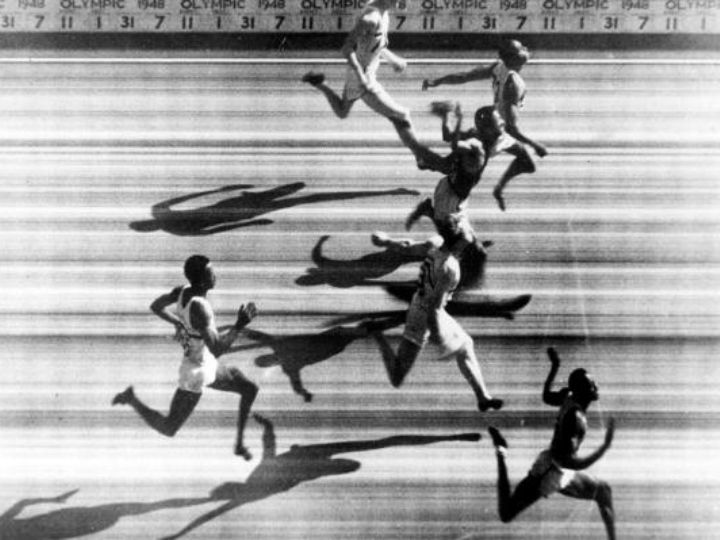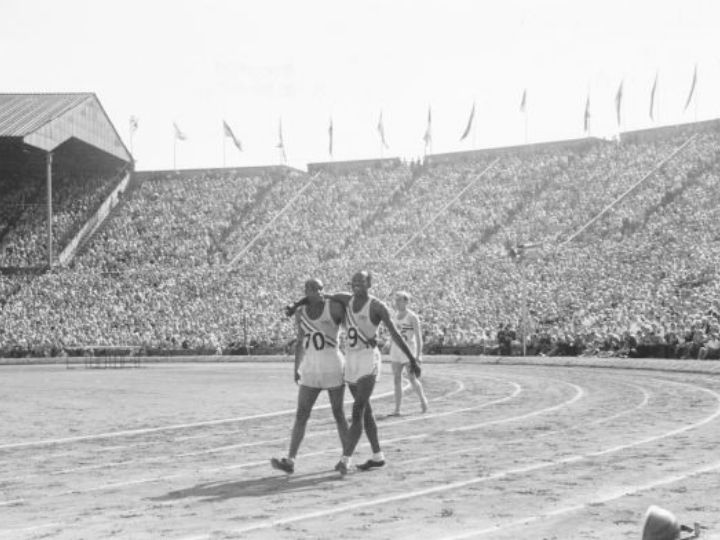[ad_1]
The gold medal won by Harrison Dillard in the 100 meters at Wembley Stadium during the 1948 London Olympics is up for auction over 75 years later.
It’s unusual to see Olympic gold medals up for auction, and this may be the first time a men’s 100m gold medal is up for grabs.
Harrison Dillard, who died in 2019, was a renowned athlete who set an unbroken record by becoming the first person to win Olympic gold in both the 100-meter sprint and the 110-meter hurdles (1952).
This and other London Olympics medals will be auctioned off this weekend at the Ingrid O’Neil auction. The opening price is $120,000, according to the website (over Rs 90 lakh).
Dillard won four Olympic gold medals in total between 1948 and 1952, three of which are still in the family, according to The Guardian.
“It was a difficult decision to make…,” Dillard’s daughter Terri remarked of the medal’s sale.
“…I’m hoping it will be given to someone who will value and respect it.” In the report, she was cited as stating, “Hopefully, a museum where it can be on exhibit.” “My father never displayed the medals at home, but he’d always get them out whenever someone asked.” One of them was set on a gold chain for him by my mother, and he wore it occasionally.”
Harrison Dillard’s 1948 Sprint Gold: The Backstory
Dillard, who was 25 at the time, may not have even been in London for the 1948 Olympics, let alone winning gold in an event he didn’t specialize in.
Dillard was one of the best sprint hurdlers of all time at the time, with a world record to his credit. During the American trials for the Games, however, he was unable to qualify for the hurdles, which was his specialty event.
Neil Duncanson, author of The Fastest Men on Earth – The Inside Stories of the Men’s 100 Metres Champions, told the intriguing account of how Dillard got it to London and won the first of his four Olympic gold medals in The Guardian piece noted above.
Dillard had only joined the 100m event during the American trials for the 1948 Olympics “to refine his speed work for the high hurdles,” according to Duncanson.
The world champion hurdler had arrived at the trials following a run of 82 victories and a world record of 13.6 seconds in the 120-yard dash. To make the US team for London, he only needed to place third. However, while it appeared unstoppable at the time, the testing turned out to be a fiasco.
“…I came in dead last. I cleared the first hurdle, then proceeded to clear the second, the third, and the fourth, finally coming to a complete halt at the eighth. I’d completely lost the race’s flow, and my time was entirely messed up. Duncanson cited Dillard as saying, “I just stopped and didn’t even finish.”
However, the hurdler finished third in the 100m and therefore qualified for the US Olympic squad in London.
Dillard’s performance in the 100m finals in London was a tale in and of itself.
It was one of the most competitive 100m finals in Olympic history. And even Dillard wasn’t sure if he finished first right away. In reality, according to Duncanson’s account, US No. 1 Barney Ewell, who was running in Lane 2, was convinced he had won.
However, the winner was determined by a new feature introduced in the Games.
The Omega photo-finish camera was used for the first time at the 1948 Olympics, and it faithfully documented the distance between Ewell and gold.
Dillard won the race with a timing of 10.3 seconds while sprinting on the outer lane.
Ewell came in second with a time of 10.4 seconds, and Lloyd LaBeach of Panama came in third.


Duncanson wrote that Dillard went on to win another gold in a relay race that was also extremely exciting. Despite winning the sprint relay event, the US team was disqualified and later reinstated following a protest.
Dillard was also a member of the US team that competed in the Helsinki Olympics in 1952. He skipped the 100m sprint this time, opting instead to compete in the hurdles. He won gold in the race with a time of 13.7 seconds, setting an Olympic record, and then went on to win gold in the hurdles relay.
Dillard returned to London seventy years later for the 2012 Olympics, where he witnessed Usain Bolt win his second Olympic sprint title.
The veteran passed away in November of this year, at the age of 96
[ad_2]




